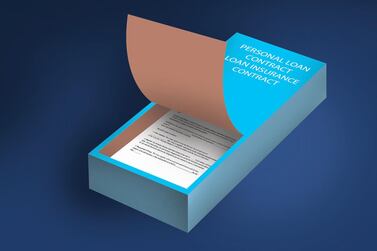I took out a secured loan against my Dubai property in 2013, which was effectively an equity release product. In 2015 I migrated to Auckland, New Zealand, where I continued to meet the repayments on the loan. However, with the recent softening of property prices in the UAE, my rental income has gone down by more than 40 per cent.
Initially the rental income helped to cover the loan repayment and I was managing to save as well. However, with rental rates dropping I now receive drastically less than the monthly repayment. This has resulted in me missing six months of payments. I asked the bank to take my property back and not to file a case against me as the loan was secured against the home. The property’s title deeds also mention the bank’s name.
I now owe Dh355,000 and there are 15 years remaining on the debt. I bought the studio apartment off-plan in 2006 for Dh425,000. It was delivered in 2009 and I had fully paid for it before I took on the equity release loan. I rent the property out for Dh38,000 a year but my monthly loan payments are Dh38,400 so I am no longer breaking even. The bank says it is looking at filing a criminal and civil case against me. The criminal case is because it asked me to sign a cheque for the loan, which it plans to pay in and the civil case is for non-payment of the instalments. I sent the bank several emails last year alerting them I was going to have a problem making the payments
I am from Pakistan and my overseas income in New Zealand as an engineer equates to Dh13,000. What are my options and who do I talk to if I am overseas? UI, Auckland
Debt panellist 1: Philip King, head of retail banking at Abu Dhabi Islamic Bank
Your situation may seem overwhelming, but it is essential to remain calm and positive so that you find a resolution to the challenges you face. Alerting your bank beforehand was a vital and necessary step, as transparency with your bank demonstrates you are willing to become fiscally responsible in addressing your debt obligations.
While there are several advantages to taking an equity release loan, one of its drawbacks is the risk it carries when the price of the property falls, especially when it is an investment property. Ultimately, if the property value is lower than the debt, the borrower is left in negative equity. This could pose an issue if you are considering refinancing.
As per UAE law, the bank is able to file criminal and civil cases due to a dishonoured cheque and deferred missed payments, respectively. When one defaults on their debt payments, the bank may present the security cheque initially provided by the debtor to recover the outstanding dues. If the cheque bounces, then the bank may lawfully file a criminal case against the debtor. Simultaneously, the bank may instigate a civil suit against you for recovery of dues.
However, such a process is lengthy, tedious and a hassle for both parties. The best course of action is to reach out to your bank and negotiate the possibility of reorganising your loan agreement to accommodate to your current situation; timely communication with your bank can lead to better negotiations.
Throughout the years, there have been various success stories where expatriates were able to make arrangements with their banks, allowing them to repay their loan instalments from abroad flexibly. In addition, you may be able to request the possibility of availing your late penalty payments for temporary relief.
Debt panellist 2: Ambareen Musa, founder and chief executive of Souqalmal.com
As per local law in the UAE, the bank has the right to file a criminal case against the borrower if the security cheque submitted by them is dishonoured due to insufficient funds in the bank account. The bank is also well within its rights to simultaneously file a civil suit to recover the outstanding debt owed by the borrower if they default on regular payments.
Given the reach of global debt collection agencies, the trail of unpaid debt could very easily find its way back to you in New Zealand. And you wouldn't want to risk being embroiled in a legal battle with the bank, which could increase the risk of detention if you come back to the UAE or even transit through the country.
Now that you're living overseas, your best bet would be to hire a legal representative who can petition the local civil court and initiate insolvency proceedings on your behalf. This can help you clear your debt in two different ways: first, by negotiating a settlement with the creditor under the supervision of a court-appointed mediator. And if that doesn't work, the court will facilitate the transition to formal bankruptcy, wherein your assets will need to be liquidated to pay off the creditor.
Here's another important fact you need to be aware of. Under the newly introduced insolvency law in the UAE, a criminal case arising due to a bounced security cheque can be temporarily suspended if bankruptcy procedures are under way in the civil court. This provision brings further debt relief to borrowers who are able to secure a court-approved settlement plan or have initiated liquidation procedures under the bankruptcy filing.
Debt panellist 3: Rasheda Khatun Khan, founder of Design Your Life
Investing in real estate is a great investment for an investor focused on growing their wealth over the medium to long term and generating an income from it at the same time. However, careful consideration should be taken when reusing the equity of the asset. If you had been able to reinvest the funds in another income or capital growth generating asset, you would be on your way to compounding your portfolio. If the loan was taken out to consolidate other debt, then your investment becomes a liability.
When you take on risk there should always be a contingency plan. If you have based your affordability of the equity release loan entirely on your rental income with no other contingency, you have set yourself up for the inevitable. The rental market is of course a moving market and therefore rates can vary, which is why an emergency fund to cover any property cost is an essential part of your investment. Should maintenance be needed or fees covered, the emergency fund is there.
"Returning" the property back to the bank is not the solution. You have a legal obligation to repay money borrowed. There is a legal process and consequences for repossession of a property back to the bank. To avoid these costly complications, consider putting the property on the market yourself. Selling a property with ready tenants makes an attractive investment.
Perhaps you can even get some equity out of it too once your loan has been cleared. In the meantime come to an arrangement with the bank where you can start making repayments. Use your rental income to make the repayments and negotiate with the bank on how the shortfall can be covered. If you have other assets or savings consider using them to reduce your equity release loan. This can at least bring down your monthly repayment.
The Debt Panel is a weekly column to help readers tackle their debts more effectively. If you have a question for the panel, write to pf@thenational.ae









